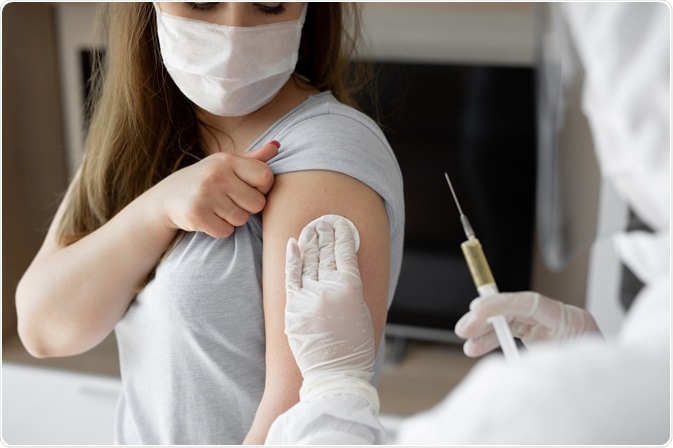To date, the global coronavirus disease 2019 (COVID-19) vaccination campaigns have allowed for more than 3 billion doses of the various approved vaccinations to be administered around the world. This figure equates to 40 doses for every 100 people, thus demonstrating the speed at which vaccines are being administered.
Despite these efforts, scientists caution that although vaccinations are essential to combat the current pandemic, they will not provide an instant solution. Some of the challenges that remain include vaccine breakthrough cases that are linked with emerging variants, as well as the limitations associated with the level of immunity provided by current vaccines.

Image Credit: Studio Peace / Shutterstock.com
Defining vaccine breakthrough cases
A vaccine breakthrough occurs when an immunized individual contracts that disease they are vaccinated against. In the case of COVID-19, vaccine breakthroughs are defined as individuals who test positive for SARS-CoV-2 after complete vaccination.
With vaccines, breakthrough cases are expected; therefore, these events do not undermine the overall efficacy of the vaccine. Thus, vaccines remain critical for preventing the spread of illnesses, with breakthrough cases usually representing a small proportion of the population.
Importantly, there is no vaccine that offers 100% protection against contracting the given illness. With all vaccines, a small percentage of those who receive them will get sick.
While COVID-19 vaccine breakthroughs may not be completely preventable, these vaccines provide a significant level of protection against developing the disease. In fact, there is some evidence that suggests that when breakthrough infections occur, the illness is less severe as compared to infections in unvaccinated individuals.
Causes of vaccine breakthroughs
The response of one individual to a given virus often differs greatly from that of other individuals. As a result, there is limited evidence that a 100% effective vaccine is an attainable goal. Thus, until the potential of personalized medicine is fully realized, which we may be several years if not decades from now, there will always be cases of breakthrough infections.
Usually, the timing between receiving a vaccination and contracting the virus is key in terms of whether infection can truly be considered a vaccine breakthrough. Due to their method of action, vaccinations do not provide instant immunity. The body needs time to build up immunity, usually over several days or weeks.
In terms of COVID-19 vaccinations, most sources estimate that at least two weeks following complete vaccination is required for the body to build sufficient immunity against SARS-CoV-2. Therefore, a person who contracts COVD-19 during this time period is considered to have a breakthrough infection. These cases have occurred because the body has not had sufficient time to build up a strong immunity against SARS-CoV-2 and is therefore vulnerable upon exposure to the virus.
The United States Centers for Disease Control and Prevention (CDC) are currently collecting data on reported COVID-19 vaccine breakthrough infections. Current estimates indicate that as the Delta strain of SARS-CoV-2 remains the dominant circulating strain, the incidence of breakthrough infections is rising.
CDC Report Shows rising Breakthrough Infections
SARS-CoV-2 variants and vaccine breakthroughs
Since the beginning of the pandemic, a number of SARS-CoV-2 variants have developed. Initially, vaccines were designed against the wild-type strain of SARS-CoV-2; therefore, currently approved vaccines may not offer the same level of immunity when encountering newer variants.
Data from the United Kingdom has found that just a single dose of the messenger ribonucleic acid (mRNA) vaccine is only around 33% effective against the ‘Delta’ variant of SARS-CoV-2. This finding caused a rise in public concern given the speed at which the variant began to spread through the country. As a result, efforts to complete the immunization of their population rose exponentially.
A preprint paper published in May 2021 has revealed the efficacy of the full dose of the Pfizer and AstraZeneca vaccines against SARS-CoV-2 variants. To this end, two full doses of the Pfizer vaccine were 88% and 93% effective against the Delta and Kent variants, respectively, two weeks after the second dose was received. The AstraZeneca vaccine was just 60% and 66% effective against the Delta and Kent variants, respectively.
Conclusion
This reduction in efficacy against SARS-CoV-2 variants may be responsible for a proportion of COVID-19 vaccine breakthrough cases. In order to provide higher levels of immunity, there will be a need for vaccine boosters in the future or a universal vaccine that provides protection against all types of coronaviruses, rather than SARS-CoV-2 and its variants alone.
References
- Abu-Raddad, L., Chemaitelly, H. and Butt, A., 2021. Effectiveness of the BNT162b2 Covid-19 Vaccine against the B.1.1.7 and B.1.351 Variants. New England Journal of Medicine,. https://www.nejm.org/doi/full/10.1056/NEJMc2104974
- COVID-19 Vaccine Breakthrough Infections Reported to CDC. Centers for Disease Control and Prevention. Available at: https://www.cdc.gov/mmwr/volumes/70/wr/mm7021e3.htm
- Iacobucci, G., 2021. Covid-19: Single vaccine dose is 33% effective against variant from India, data show. BMJ, p.n1346. https://www.bmj.com/content/373/bmj.n1346
- Tracking Coronavirus Vaccinations Around the World. Josh Holder. New York Times. Available at: https://www.nytimes.com/interactive/2021/world/covid-vaccinations-tracker.html
- What You Should Know About the Possibility of COVID-19 Illness After Vaccination. Centers for Disease Control and Prevention. Available at: https://www.cdc.gov/coronavirus/2019-ncov/vaccines/effectiveness/why-measure-effectiveness/breakthrough-cases.html
Last Updated: Aug 19, 2021